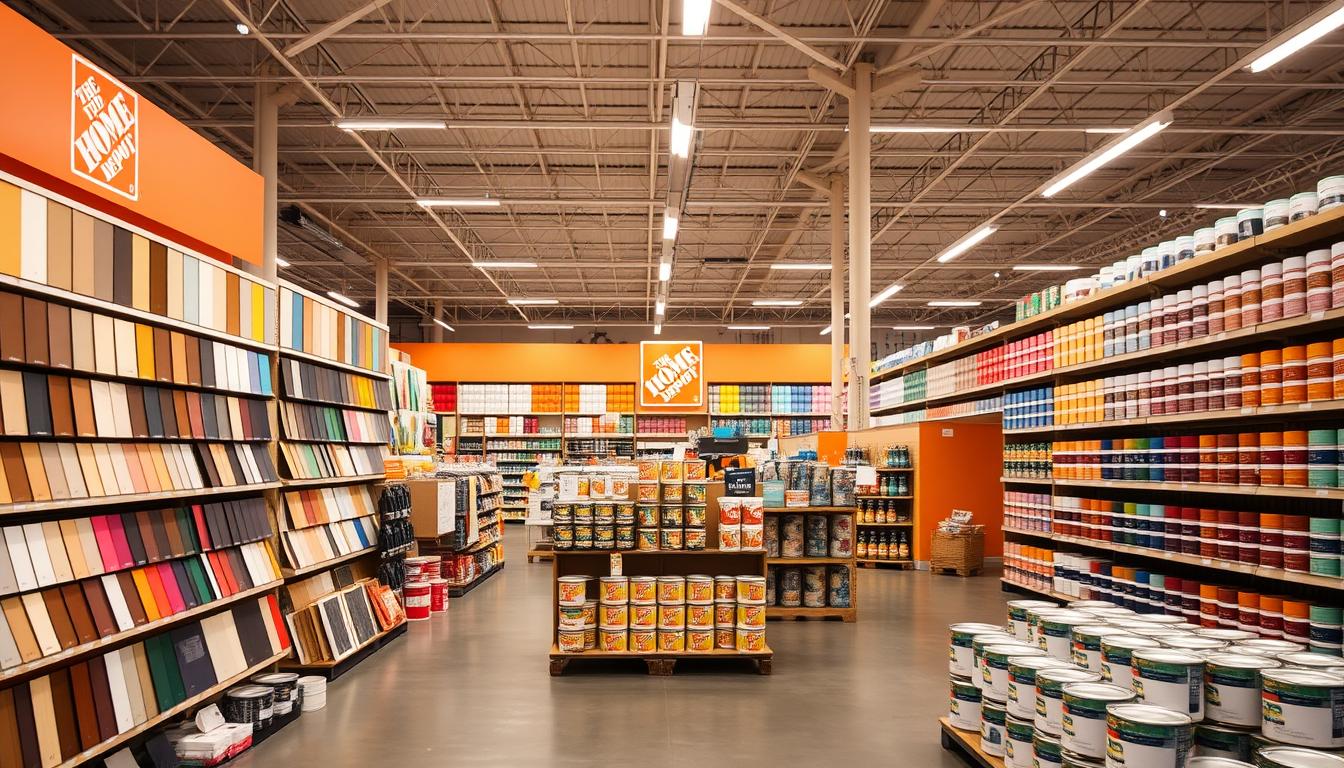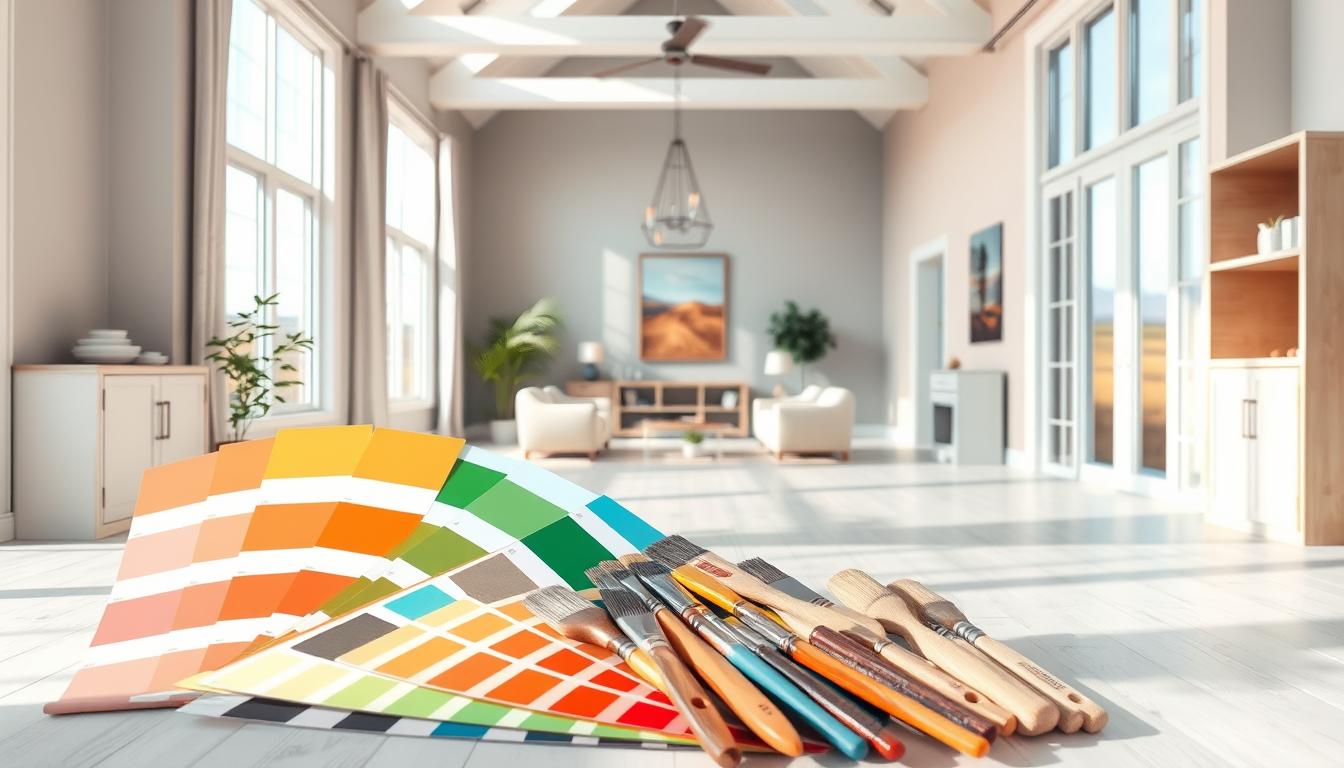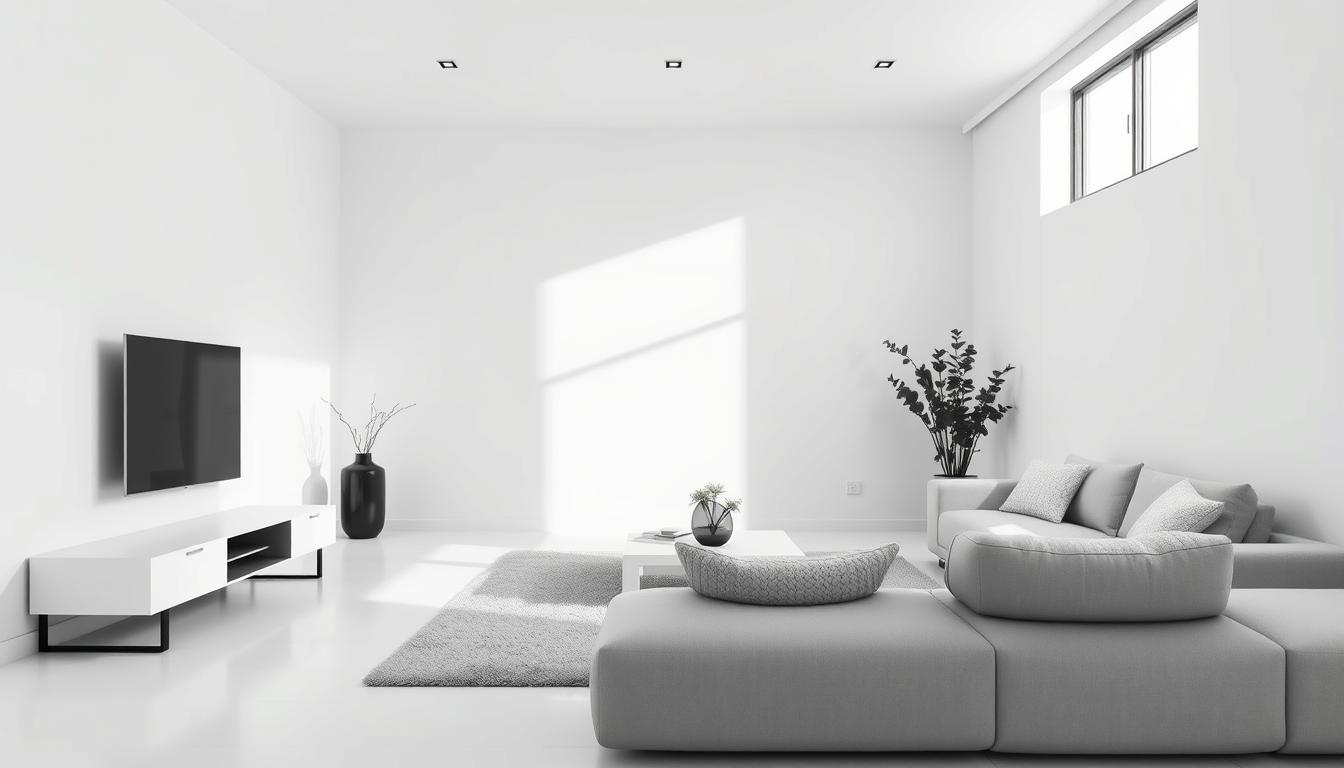Did you know the right interior paint colors can change your living space’s feel? With thousands of choices, picking the perfect shade can be tough. At Home Depot, we have a wide range of paint colors for all tastes.
Finding the right paint selection is key for the look you want in your home. This article will help you find the best Home Depot interior paint colors for your project.
Key Takeaways
- Explore the vast selection of paint colors at Home Depot.
- Learn how to choose the perfect shade for your home.
- Discover the different types of paint and their uses.
- Find out about popular paint brands and their characteristics.
- Get tips on selecting eco-friendly paint options.
Understanding Home Depot’s Interior Paint Offerings
Home Depot has a wide range of interior paints to help us pick the perfect color for our homes. We can easily find the right paint that matches our style and preferences.
Types of Interior Paint Available
Home Depot offers different types of interior paint. Latex paint is easy to use and dries quickly, making it great for most projects. Oil-based paint gives a durable finish but takes longer to dry and has stronger fumes. For better air quality, low-VOC paints are a good choice as they release fewer harmful chemicals.
| Type of Paint | Characteristics | Best Use |
|---|---|---|
| Latex Paint | Easy to clean, quick drying | General interior painting |
| Oil-Based Paint | Durable finish, strong fumes | Trim work, furniture |
| Low-VOC Paint | Fewer VOCs, eco-friendly | Interior projects where air quality is a concern |
Popular Brands We Trust
Home Depot sells top brands known for quality and performance. Sherwin-Williams is loved by pros and DIYers for its wide color and finish options. Behr is also popular for its quality paints at good prices. Glidden offers durable and beautiful paints too.
Eco-Friendly Options
Home Depot has eco-friendly paints without harsh chemicals for those who care about the environment. These paints are good for the planet and our health. Choosing them helps us reduce our environmental impact while still getting the look we want for our homes.
Choosing the Perfect Color Palette for Our Home
Choosing the right color palette for our home involves several factors. These include the room’s purpose and the natural light it gets. The right colors can greatly change how our home feels and looks.
Analyzing Room Functionality
The purpose of a room greatly influences its color. For example, bedrooms need calming colors for rest. Living rooms, on the other hand, might do well with brighter colors to encourage gatherings.
- Bedrooms: Soft, calming colors like light blues or pale greens.
- Living Rooms: Warm, inviting colors such as beige or terracotta.
- Home Offices: Focus-enhancing colors like greens or neutral tones.
Considering Natural Light
Natural light plays a big role in how paint colors look. It’s important to test colors in different lighting to make sure they look good all day.
Trends in Home Interior Colors
Keeping up with the latest home color trends is helpful. Right now, Home Depot paint color trends mix classic neutrals with bold colors.
| Trend | Description | Recommended Colors |
|---|---|---|
| Classic Neutrals | Timeless and versatile | Soft whites, creamy beiges |
| Bold Statements | Making a statement with color | Deep blues, rich reds |
| Nature-Inspired | Bringing the outdoors in | Earth tones, greens |
By thinking about these factors and keeping up with Home Depot paint color recommendations, we can pick colors that look great and make our home more functional.
Popular Home Depot Interior Paint Colors
Home Depot has a wide range of interior paint colors for every taste. Whether you want something classic or bold, they have it all. Their collection is vast, catering to all preferences.
Classic Neutrals
Classic neutrals are popular for their clean look. Colors like Simply White and ProClassic White are favorites. They provide a versatile backdrop for any decor.
These colors are pleasing to the eye and easy to change up. Home Depot’s swatches let us test these shades at home. This ensures we find the perfect match.
Bold & Vibrant Shades
For a bold statement, Home Depot’s vibrant shades are perfect. Colors like Deep Space and Fire Engine Red add drama. They can be a focal point or energize a room.
These colors can highlight a single wall or the whole room. Home Depot’s staff can help pick the right shade for your style.
Soft Pastels
Soft pastels are a gentle way to add color. Shades like Pale Pink and Baby Blue bring calm. They’re great for nurseries, bedrooms, or bathrooms.
These soft hues can tie rooms together. Home Depot offers many pastel shades. We can find the perfect one for our taste.
How to Use Color to Influence Mood
The colors we pick for our home’s interior can really change how we feel. When picking home depot interior paint colors, think about how different colors make us feel.
Colors fall into two main groups: warm and cool. Each group makes us feel different ways. Knowing this helps us create the right mood in our homes.
Warm vs. Cool Colors
Warm colors like oranges, reds, and yellows make us feel cozy. They’re great for places where we want to hang out, like living rooms and dining areas. Cool colors, like blues, greens, and purples, calm us down. They’re best for bedrooms and bathrooms where we want to relax.
Color Psychology in Home Decor
Color psychology is key in home decor. Different colors can change our mood, energy, and even how hungry we are. For example, red can make us hungry, so it’s good for dining rooms. Soft blues and greens help us relax, making them perfect for bedrooms.
Creating a Relaxing Atmosphere
To make a room feel calm, choose colors like light blues, pale greens, or neutral tones. These colors can lower stress and make us feel at peace. Using one color scheme or colors that go well together also adds to a room’s calm feel.
By picking the right home depot interior paint colors and knowing how colors affect us, we can make spaces that are not just pretty but also good for our mood and health.
Preparing for Your Paint Project
To get a professional finish, we must prepare well for our paint project. Good preparation makes painting smooth and efficient. This leads to a top-quality result.
Gathering Necessary Supplies
First, we gather all needed supplies. This includes picking the right paint from Home Depot’s wide range of colors. We also get brushes, rollers, trays, and other tools for our project.
Key supplies to gather:
- Paint
- Brushes of various sizes
- Rollers and extension poles
- Paint trays
- Drop cloths or tarps
- Sandpaper or a sanding block
Prepping Walls and Surfaces
Preparing walls and surfaces is key for a smooth finish. We start by cleaning walls to remove dirt, grime, or grease. Then, we fill holes or cracks with spackling compound and sand them smooth.
Tips for prepping walls:
- Clean walls with a mild detergent
- Fix holes and cracks with spackling compound
- Sand surfaces to create a smooth base
- Remove old paint or wallpaper if necessary
Choosing the Right Tools
Choosing the right tools is crucial for our paint project’s success. The right brush size and type can help achieve a precise finish. Home Depot has a variety of tools to help us.
When picking tools, think about our project’s specific needs. For big areas, a roller with an extension pole works well. For detailed work, smaller brushes are better.
Techniques for Applying Interior Paint Successfully
With the right techniques, we can transform our living spaces with a fresh coat of paint from Home Depot. The success of an interior paint job heavily relies on the application methods used.
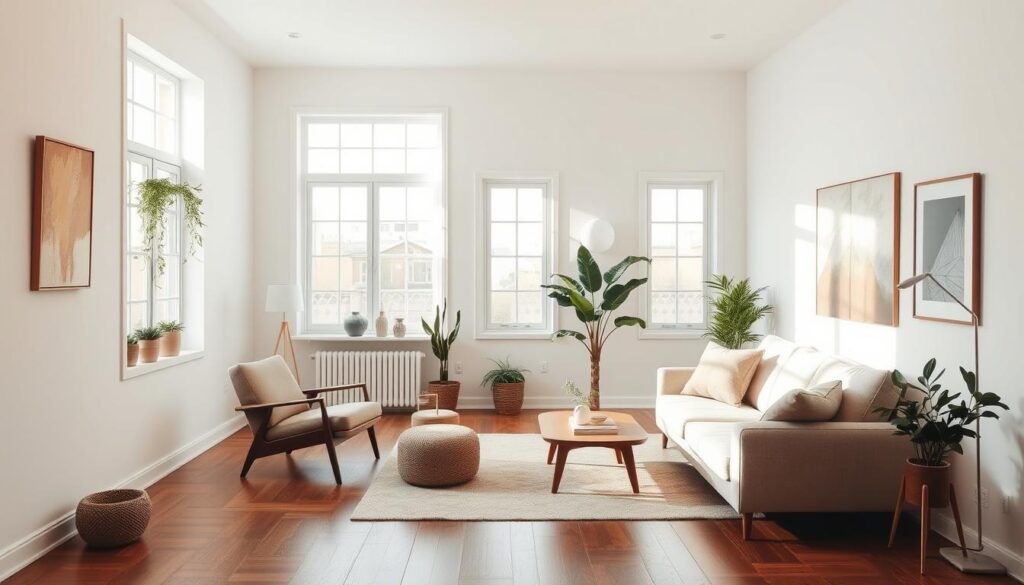
Brush vs. Roller
Choosing between a brush and a roller depends on the surface and the desired finish. For instance, rollers are ideal for large, flat areas, providing a smooth, even coat quickly. On the other hand, brushes are better suited for edges, corners, and detailed work, offering precision and control.
Techniques for Smooth Finish
To achieve a smooth finish, it’s crucial to work in sections, maintaining a “wet edge” to prevent visible lines. Using the right amount of paint on the roller or brush is also vital; too much paint can lead to drips, while too little may result in an uneven coat.
- Load the roller or brush with the appropriate amount of paint.
- Work in small sections, typically 4 feet by 4 feet.
- Apply paint in a ‘W’ or ‘M’ pattern with rollers to ensure even coverage.
Tips for Edge Cutting and Detailing
Edge cutting and detailing require patience and a steady hand. Using a high-quality brush and the right technique can make a significant difference. It’s also helpful to use painter’s tape to create sharp, clean lines, when painting near trim or ceilings.
By mastering these techniques, we can ensure a professional-looking result. This enhances our home’s beauty and value, making the most of our chosen Home Depot interior paint colors.
Finding Inspiration for Our Next Project
Finding the right paint colors and finishes can be tough. But Home Depot is here to help. They offer many resources to boost our confidence and creativity for painting projects.
Home Depot Design Workshops
Attending Home Depot Design Workshops is a great way to find inspiration. These workshops offer hands-on learning and expert tips on home decor trends. We can learn about paint colors, finishes, and techniques, helping us make better choices for our projects.
Online Resources and Tools
Home Depot also has online resources and tools for inspiration. Their website has a color finder tool to try paint colors on your photos. Plus, there’s a project planner to help organize our painting plans.
Customer Photo Galleries
Home Depot’s customer photo galleries are another great inspiration source. These galleries show real projects done by customers. By looking at these, we can get ideas and see how paint colors work in different settings.
With these resources, we can find the inspiration we need for our painting projects. Home Depot has everything we need, from the perfect paint color to application tips.
Understanding Paint Finishes and Effects
Paint finishes are key to making our walls look great and last long. The right finish can change how our paint looks and how well it holds up. It’s important to pick the best finish for each room.
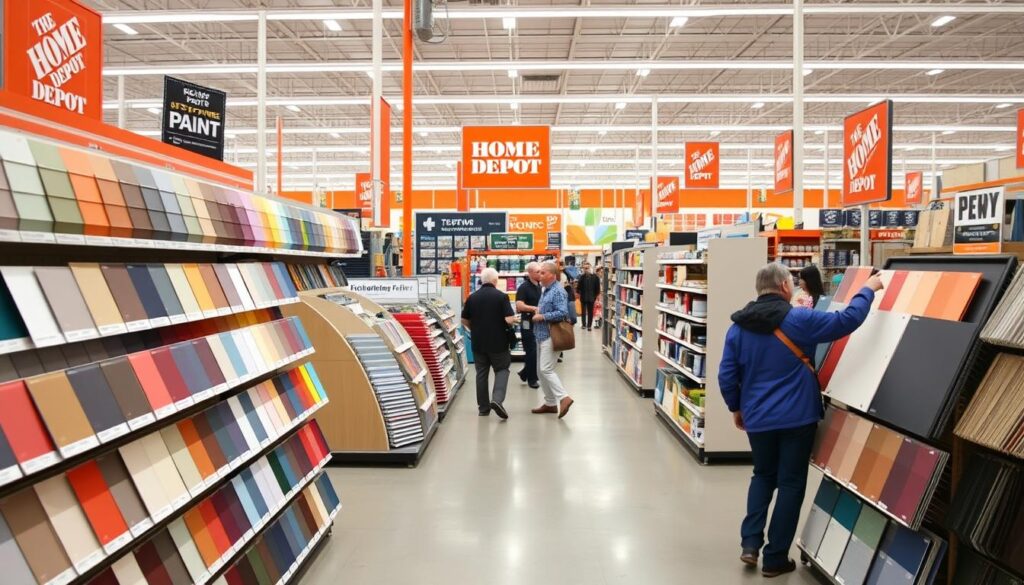
Matte, Satin, and Gloss Explained
Different paint finishes have their own benefits. For example:
- Matte Finish: Great for places that don’t get a lot of use and ceilings, as it looks flat and doesn’t reflect light.
- Satin Finish: It has a soft sheen, making it good for most rooms. It’s durable and looks nice.
- Gloss Finish: This finish is shiny and tough. It’s best for areas that get a lot of use, like trim and doors.
Want to know more about picking the right paint? Check out our guide on finding the perfect interior paint for your home.
Specialty Finishes and Textures
There are also special finishes that can make our walls stand out:
- Textured Finishes: They can cover up flaws and add interest to the walls.
- Metallic Finishes: These finishes give a shiny, metallic look.
- Venetian Finishes: They create a look that’s like marble, with layers.
Choosing the Right Finish for Each Room
Choosing the right finish depends on the room’s use and look you want. For example:
| Room | Recommended Finish | Reason |
|---|---|---|
| Living Room | Satin | It’s a good mix of looks and durability. |
| Kitchen | Gloss or Semi-Gloss | It’s easy to clean and stands up to moisture. |
| Bedroom | Matte or Flat | It makes the room calm and doesn’t reflect light. |
Knowing about different paint finishes helps us make smart choices for our painting projects. This way, we can get the look we want.
Budgeting for Our Painting Projects
When we plan a painting project, setting a budget is key. It helps us make smart choices and avoid surprises. A good budget keeps our project on track financially.
Understanding Paint Costs
The price of paint changes based on the brand, quality, and how much you buy. Home Depot has many interior paint options from Behr and Glidden. Knowing these costs is vital for a solid budget.
- Consider the price per gallon
- Factor in the cost of additional coats
- Look for sales or discounts on paint
Estimating the Needed Amount
To figure out how much paint we need, we must measure the walls and plan for coats. A good rule is that one gallon covers about 350-400 square feet.
- Measure the length and height of each wall
- Calculate the total surface area
- Adjust for windows, doors, and trim
Other Expenses to Consider
There are other costs to think about, like tools and supplies. These might include:
- Brushes and rollers
- Paint trays and liners
- Drop cloths and tape
By thinking about these costs and planning well, we can make a detailed budget. This way, we can stay within our budget and achieve a great result.
Maintaining Our Painted Surfaces
To keep our walls looking their best, regular maintenance is key. After picking the perfect Home Depot interior paint colors, we must keep our painted surfaces vibrant and fresh.
Cleaning Best Practices
Use mild detergents and soft cloths to gently clean our painted walls. This removes dirt and grime. Avoid harsh chemicals or abrasive materials that can damage the paint.
Addressing Minor Damages
For minor damages or scuffs, touch-up techniques work well. By saving some of the original paint, we can easily fix affected areas. Home Depot paint color swatches help us match our original color.
Knowing When to Repaint
Over time, our paint may fade or get damaged. When this happens, it’s time to repaint. Choosing from Home Depot’s top selling paint colors can give our walls a fresh new look.

